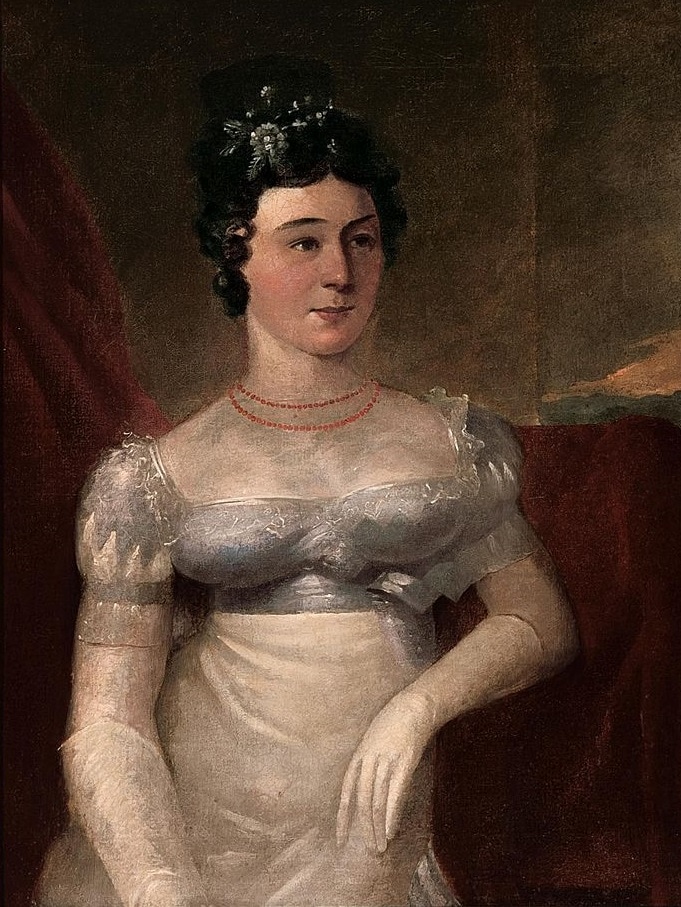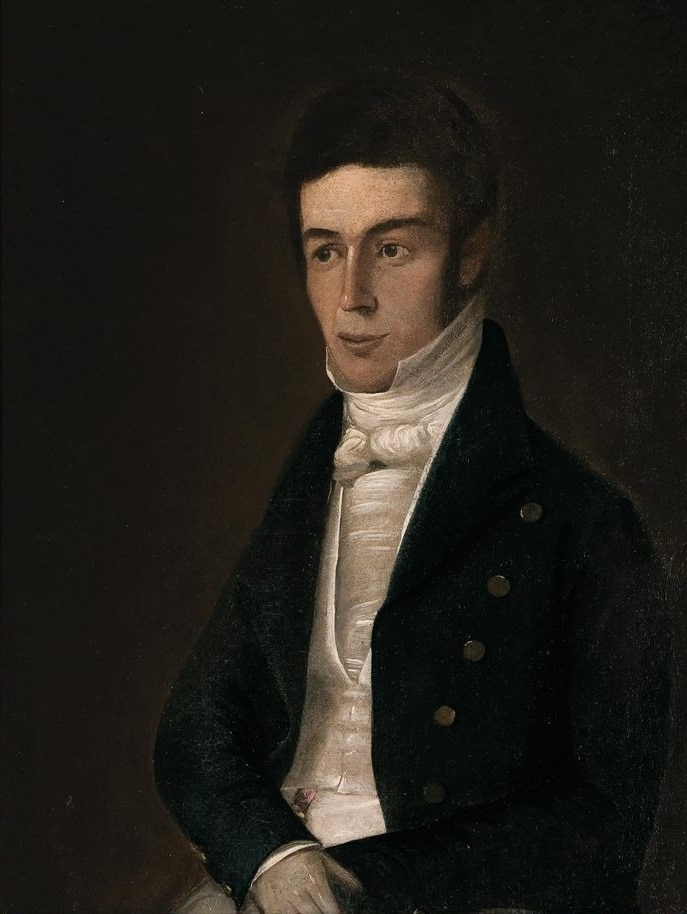THIS PAGE FIRST POSTED 10 OCTOBER 2017
LAST MODIFIED Monday 22 April 2024 9:38
Barnett Levey
Dr GRAEME SKINNER (University of Sydney)
THIS PAGE IS CURRENTLY UNDER CONSTRUCTION
To cite this:
Graeme Skinner (University of Sydney),
"Barnett Levey",
Australharmony (an online resource toward the early history of music in colonial Australia):
https://sydney.edu.au/paradisec/australharmony/levey-barnett.php; accessed 26 February 2026


Sarah Levey, Sydney, c.1825-26; by Augustus Earle (1793-1838); Art Gallery of South Australia
https://www.agsa.sa.gov.au/collection-publications/collection/works/mrs-barnett-levey/23234 (IMAGE)
Barnett Levey, Sydney, c.1825-26; by Augustus Earle (1793-1838); Art Gallery of South Australia
https://www.agsa.sa.gov.au/collection-publications/collection/works/mr-barnett-levey/23235 (IMAGE)
LEVEY, Barnett (Barnet; Mr. LEVEY; LEVY)
Vocalist, theatre proprietor, concert presenter, entrepreneur
Born London, 1798
Arrived Sydney, NSW, 17 December 1821 (free per John Bull, from Cork, 25 July)
Died Sydney, NSW, 2 October 1837, aged 39
https://trove.nla.gov.au/search?l-publictag=Barnett+Levey (TROVE tagged by Australharmony)
http://nla.gov.au/nla.party-1470117 (NLA persistent identifier)
LEVEY, Sarah Emma (WILSON; step-daughter of Jacob JOSEPHSON)
Theatre proprietor
Died Dawes Point, NSW, 1873
https://trove.nla.gov.au/search?l-publictag=Sarah+Emma+Levey+d1873 (TROVE tagged by Australharmony)
See also TROVE items tagged Theatre Royal Sydney for 1830s:
https://trove.nla.gov.au/search?l-publictag=Theatre+Royal+Sydney (TROVE tagged by Australharmony)
See also mainpage on Sydney Amateur Concerts of 1826-27:
https://sydney.edu.au/paradisec/australharmony/sydney-amateur-concerts-1826-27.php
Summary
Having come to Australia to join his emancipist brother Solomon Levey, Barnett Levey established himself as a merchant, in June 1825 Levey married Sarah Emma Wilson, stepsister of the musician (later judge) Joseph Frey Josephson.
Levey regularly sang at convivial dinners, and also participated in the Sydney Amateur Concerts in 1826, specialising in comic songs, such as, in June, The beautiful boy, according to the Gazette, "given with the most irresistable drollery". In September he reportedly sang:
. . . a comic song, a medley, with his usual humour, but without an accompaniment; the want of which, Mr. L.'s voice, though it is not without strength and compass, could but ill spare." However, he also extended his repertoire at the October concert to sing Braham's The Death of Nelson. During the latter part of 1827 and 1828, no more public concerts were advertised.
Meanwhile, Levey continued to hatch plans to establish a new theatre in Sydney, and in 1828 began building suitable premises, eventually attaching a hotel, the Royal, at the front to help pay for the venture. Public entertainment generally was struck a blow when, on 1 September 1828, the naturally austere and censorious governor, Ralph Darling, promulgated An act for regulating places of public exhibition and entertainment, which henceforth required a government license to present:
. . . any Interlude, Tragedy, Comedy, Opera, Concert, Play, Farce, or other, Entertainment, of the Stage, or any Part or Parts thereof, or any Stage-dancing, Tumbling, or Horsemanship, or any other public Entertainment whatever, to which Admission shall or may be procured by Payment of Money, or by Tickets . . .
In June 1829, Darling did finally issue a license to allow Levey to give balls and concerts, and a few such events were held, with music organised by Joshua Josephson and John Edwards. However, Darling then withdrew the license in January 1830. The former military bandmaster George Sippe took over as licensee of the hotel temporarily in June 1831, and remained as one of the theatre's leading musicians.
In 1832, Levey's Theatre Royal was duly licensed by Darling's more liberal successor Richard Bourke, opening with Levey's first musical "at home" in August 1832, followed by its theatrical opening in December. In 1833, as the Monitor described it:
The new Theatre is larger than the Adelphi Theatre in London, superior in size and appearance to most of the country Theatres in the United Kingdom, and altogether, we entertain this pleasing hope, that henceforth, the Sydney Theatre will become truly respectable, as regards the public and profitable as regards the zealous, laborious, and persevering Lessee.
Levey advertised for partners in January 1834, and in February Joseph Simmons joined in the management.
Thereafter, Levey mostly ceded control of the theatre to lessees, and faced the prospect of further competition when, in mid 1836, Joseph Wyatt announced plans to open a second theatre (ultimately the Royal Victoria).
In January 1837, after the play, Levey made "his first appearance this Season" singing one of his favourite songs, The old commodore "in character", and the last performance under his management was of the "grand national and patriotic pageant and Spectacle of Napoleon Bonaparte" in April 1837.
In September the Gazette reported that:
The stage manager of the Sydney Theatre, we understand, has found it absolutely necessary, in order to enable him to conduct the business of the house with anything like propriety, to stipulate for the entire exclusion of Mr. Barnett Levy, the proprietor, from behind the scenes, it being found that his presence and interference is anything but conducive to the prosperity of the drama.
He died a few days later, and thereafter his widow Sarah, with the assistance of her step-father Jacob Josephson, briefly and unsuccessfully tried to keep the theatre running, leading to a public rift with several former employees, notably, as reported in July 1838, the band cellist George Sippe.
Documentation
"PUBLIC DINNER TO HIS EXCELLENCY SIR T. BRISBANE", The Sydney Gazette and New South Wales Advertiser (10 November 1825), 3
http://nla.gov.au/nla.news-article2184661
"SYDNEY AMATEUR CONCERT", The Sydney Gazette and New South Wales Advertiser (24 June 1826), 3
http://nla.gov.au/nla.news-article2186054
"THE CONCERT", The Australian (30 September 1826), 3
http://nla.gov.au/nla.news-article37074453
"MR. SIPPE'S BENEFIT CONCERT", The Monitor (13 October 1826), 5
http://nla.gov.au/nla.news-article31757909
"The Drama", The south-Asian register (January 1828), 151-53
https://nla.gov.au/nla.obj-608525416/view?partId=nla.obj-608544374#page/n50/mode/1up
"Concert - Theatre", The south-Asian register (April 1828), 280-81
https://nla.gov.au/nla.obj-608525434/view?partId=nla.obj-608559576#page/n85/mode/1up
Concert.
In January, a collection of musical instruments arrived for the Sydney Amateur Concert; but that pleasing break on the dulness of colonial times, for the want of spirit, of energy, of unanimity, of impulse, or of nobody knows what, had been long discontinued. Month after month, we waited to hear when the next Concert would be; when we might again hear Professor Edwards drawing out the soul of his violin, bidding it "discourse excellent music;" when we might see the beauty and fashion of Sydney met together, for no matter what, if we could but be refreshed with an hour's gaze: but hitherto we have waited in vain; and now, we shall not be disappointed any longer.
Theatre.
We have strong hopes that we shall see the players by and by. Mr. Barnett Levey, our little vivacious colonist, has erected a pile of buildings which will cost him about £15,000, and the front part he intends for a theatre, or theaitre, as he calls it. He has been indefatigable in promoting the interests of the drama, as he avers, not for himself, but, for the public; and we must say, we believe him, because we believe him to be a genuine amateur of histrionic lore. He has obtained £5 shareholders in the management of the exhibitions, to the number of two hundred and fifty or upwards, all good marks, and therefore there seems no likelihood of failure. Why should there be? Do any people of clear sense, love melancholy better than mirth - the bottle, scandal, sensuality, or moping? In America, every town which can muster a population of two thousand souls, has a theatre, and some even two. We do not say that a theatre should be erected before a Church in a new Colony, or that liberty is before religion; but we think they each claim serious and impartial consideration. When Mr. Barnett Levey's theatre is opened, he will deserve a vote of thanks from his fellow-townsmen. He is a man of singular enterprise. To build a theatre for the public benefit, like what he has built, and a warehouse behind it, four stories high, with a handsome lofty windmill, surmounting the roof, is not a common performance in England.
[Government order], The Sydney Gazette and New South Wales Advertiser (3 September 1828), 1
http://nla.gov.au/nla.news-article2190976
"Musical Concert", The Sydney Gazette and New South Wales Advertiser (20 June 1829), 2
http://nla.gov.au/nla.news-article2192714
"Rejected Addresses [No. 1]: To have been spoken at the Opening of the Opera House, Sydney, August 1829", The Sydney Gazette and New South Wales Advertiser (12 September 1829), 3
http://nla.gov.au/nla.news-article2193399
"THE CONCERT", The Sydney Gazette and New South Wales Advertiser (19 September 1829), 2
http://nla.gov.au/nla.news-article2193445
"MR. LEVEY'S CONCERT", The Sydney Monitor (22 August 1829), 3
http://nla.gov.au/nla.news-article32072292
[News], The Sydney Gazette and New South Wales Advertiser (26 September 1829), 2
http://nla.gov.au/nla.news-article2193494
"EXTRACTS FROM THE DIARY OF A DILETTANTE", The harmonicon 8 (1830), 171
http://books.google.com.au/books?id=IwYVAAAAQAAJ&pg=PA171
24th [March 1830]. By letters just received from New South Wales, it appears, that the first public concert performed in Australasia, was given in September last, in the Sydney theatre, which has not yet been licensed for dramatic performances. The display of musical talent, it is stated, was great; and the "assemblage of rank and fashion," says the writers, "such as might vie with the London soirees." I presume that where so much "rank and fashion" were collected together, nothing from The Beggar's Opera was attempted. It is considered a proof of ill-breeding to introduce some parts of that work even in England, particularly when certain members of the senate are present: in New South Wales a mere allusion to it would infallibly be treated as a violent infraction of the laws of good society, and subject any person so offending to instant expulsion, if not actual chastisement. By-the-by, I should think that there is a very good opening for a harpist at Sydney. So favourable an opportunity of settling for life should not be lost; especially by any one out of employment.
"Domestic Intelligence", The Sydney Gazette and New South Wales Advertiser (27 June 1831), 4
http://nla.gov.au/nla.news-article12843204
[Advertisement], The Sydney Herald (27 August 1832), 1
http://nla.gov.au/nla.news-article12845147
"LEVY AT HOME", The Sydney Herald (13 September 1832), 3
http://nla.gov.au/nla.news-article12845266
"THEATRE-ROYAL, SYDNEY", The Sydney Herald (31 December 1832), 3
http://nla.gov.au/nla.news-article12846015
[News], The Sydney Monitor (25 September 1833), 3
http://nla.gov.au/nla.news-article32144567
"To the Editor", The Sydney Monitor (31 March 1837), 3
http://nla.gov.au/nla.news-article32155419
"THE DRAMA", The Sydney Gazette and New South Wales Advertiser (23 September 1837), 2
http://nla.gov.au/nla.news-article2213068
"DEATHS", The Australian (3 October 1837), 3
http://nla.gov.au/nla.news-article36854745
[News], The Australian (3 October 1837), 4
http://nla.gov.au/nla.news-article36854733
Mr. Barnett Levy, who emigrated to this colony a number of years back, and who first introduced theatricals, died early yesterday morning, only forty years of age. He has left a widow and four children to mourn his loss. His remains will be interred in the Jewish Burial Ground this morning, and we believe they will be followed to their last home by many of his friends.
"THINGS THEATRICAL", The Sydney Gazette and New South Wales Advertiser (3 April 1838), 2
http://nla.gov.au/nla.news-article2539659
"Law Intelligence", The Sydney Gazette and New South Wales Advertiser (13 July 1838), 3
http://nla.gov.au/nla.news-article12857998/1527185
"HOW THE DRAMA STRUCK ROOT IN SYDNEY", The Sydney Morning Herald (26 September 1891), 5
http://nla.gov.au/nla.news-article13840270
Select bibliography and resources
G. F. J. Bergman, "Levey, Barnett (1798-1837)", Australian dictionary of biography 2 (1967)
http://adb.anu.edu.au/biography/levey-barnett-2352
"Levey, Barnett (1798-1837)", Obituaries Australia
http://oa.anu.edu.au/obituary/levey-barnett-2352
Ailsa McPherson, "Barnett Levey's Theatre Royal", Dictionary of Sydney, posted 2010
https://dictionaryofsydney.org/entry/barnett_leveys_theatre_royal
© Graeme Skinner 2014 - 2026